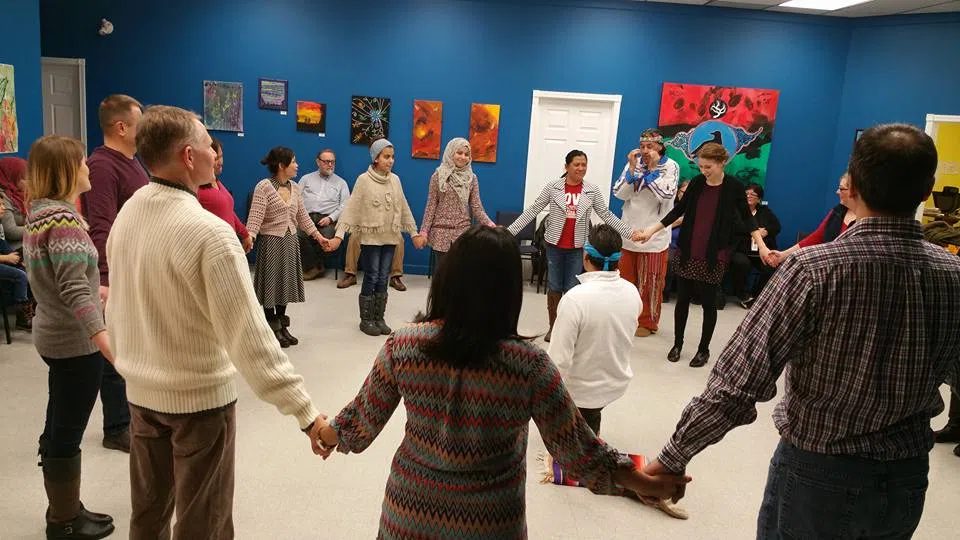
The Common Ground Project Partners with SK Cultural Exchange
After a successful Phase II pilot project with The Common Ground Project in Prince Albert, Phase III will begin with a fantastic partnership with The Saskatchewan Cultural Exchange.
The PA Common Ground Project works to bring together First Nations, Metis, Newcomers and Immigrants to bridge that gap that has been identified by creating programming that will bring the two groups together to help everyone realize what we have in common rather than what divides us. The Common Ground Project’s ultimate goal is to remind each group about our humanness – the things we all share.
Partnering with the Saskatchewan Cultural Exchange and its Artists in Communities Program for its first project is a perfect fit.
SaskTel is pleased to sponsor the Artists in Communities program.
August 1-3 Victor Thunderchild of Prince Albert will facilitate a workshop to educate 20 First Nations/Metis students from the Prince Albert Indian/Metis Friendship Centre and 20 children of recently settled immigrants from the YWCA Settlement Services, to learn about First Nations culture. The programming will be at the Prince Albert Indian Metis Friendship Centre.
Thunderchild is well known in Prince Albert as an educator and a traditional dancer with a strong background in First Nations traditional stories and songs. He will be working with the children in a fun atmospher to discuss basic history of First Nations people, some basic Cree language, and drumming.
The Common Ground Project is very excited to partner with the Saskatchewan Cultural Exchange for this and hopefully other future projects.
In Phase III The Common Ground Project is working through the Multicultural Council of Saskatchewan with local partners Prince Albert Multicultural Council, The Prince Albert Indian and Metis Friendship Centre and the YWCA Settlement Services.
More About Victor Thunderchild:
Victor Thunderchild comes from the Thunderchild First Nation but has lived in Prince Albert for the past 25 years.
He has been married to Vi Thunderchild for the past 28 going on 29 years with 3 wonderful adult children. Jeremy, Renee, and Ryanda, with one very adorable Grandson Mason Ray Ahenakew.
He is the youngest son of Victor Thunderchild Sr. who was the lead singer of the Thunderchild Singers in the 70’s to early 80’s. He, along with Grandfather Ed, Uncle Harrison and older brother Ray were one of the first groups to record powwow songs through Sunshine Records. So singing and powwow life has always been a part of our lives.
He has been teaching for the past 26 years, 25 of which have been at Carlton Comprehensive Public High School. He taught in the Thunderchild First Nation for the first year of his teaching career then moved to Prince Albert the following year. All those years he taught in the Social Sciences and teaching the Cree language to students. He has taught mostly the Native Studies programs but has also experienced teaching the History and Social Studies programs, all in the 10, 20 and 30 levels.
Victor received his B. Ed degree from the Indian Teacher Education Program (ITEP) within the University of Saskatchewan in 1991. He is currently working on a M. ED with the SUNTEP Program here in Prince Albert and will complete that at the end of July. Within those years, he has worked with several committees in the Social Science provincial subject council, along with the STF, and was an advisor with the Canadian Teachers Federation for 3 years and is currently a councillor with the PAATA of the SRSD119.
In the Cree 10, or now called Nehiyawewin 10, his focus is teaching the Conversational Cree and basics to the students. Much of the language is taught in the context of the language, not the specific word. This allows for better learning and understanding for the student. I
He is a Men’s Traditional dancer in The Powwow Circuit which has allowed him to gain an understanding of the culture and way of life. Both Victor and Vi live their lives according to how they were taught.
“Teaching newly landed immigrants will be a great challenge for me, as they are new and don’t know much about the Indigenous people of Canada. I have the opportunity to teach them about the written agreements signed between the two nations as a foundation for their learning. This will allow them to know the historical relationship between the two nations and why they work so closely together.
I will teach them the philosophy of the drum and why we use it in all our ceremonies and the significance it has for all Indigenous people. Along with the teachings of the drum, I will teach them how song and language go hand in hand. This way they will be able to understand why some songs have words in them and some don’t.
I look forward to teaching them soon.”


